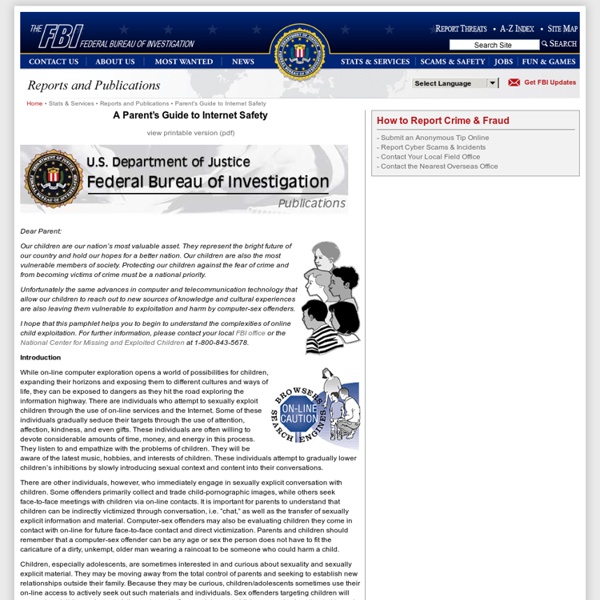7 Ways To Protect Your Kids on the Internet
By Dr. Leigh Baker - April 16, 2002 To ensure that your child's experience on the Internet is a safe one, parents need to check their child's website activity and email. Even for teens, who might think of this as an invasion of privacy, parents need to talk openly to them about their Internet use. Older teens are actually more likely to get into trouble than younger children, because they are more apt to explore the out-of-the-way nooks and crannies of cyberspace and reach out to people outside of their immediate peer group. If you decide to use software that will block or restrict your child's access to certain websites, discuss this decision with your child so that he or she will understand why it is necessary. 1. 2. 3. 4. 5. 6. 7. Like this? Sign up for Today's Big Story
Internet Safety
Listen The Internet can be a wonderful resource for kids. They can use it to research school reports, communicate with teachers and other kids, and play interactive games. Kids who are old enough to swipe a screen can have access to the world. But that access can also pose hazards. For example, an 8-year-old might do an online search for "Lego." That's why it's important to be aware of what your kids see and hear on the Internet, who they meet, and what they share about themselves online. As with any safety issue, it's wise to talk with your kids about your concerns, take advantage of resources to protect them, and keep a close eye on their activities. Internet Safety Laws A federal law, the Children's Online Privacy Protection Act (COPPA), was created to help protect kids younger than 13 when engaged in online activities. But even with this law, your kids' best online protection is you. Online Protection Tools Getting Involved in Kids' Online Activities Basic Rules A Word of Caution Back
Official Site for Net Nanny | Parental Internet Controls | Net Nanny
Web Security: Tips to Protect Kids Online | Microsoft Protect
Four things you can do to help protect kids online Follow these steps to help protect your children's privacy and safety when they're using the computer. Step 1. It's a good idea to visit some sites for kids. Read the privacy statement and, if you don't agree with it, search a little, to find a similar site that doesn't request personal information. Block inappropriate content One of the best defenses against inappropriate content is to block it before you see it. Windows 8, Windows 7, and Windows Vista Parental Controls. Xbox parental controls. For more information, read Set parental controls for Xbox 360 and Xbox LIVE. Step 2: Increase your security and privacy In addition to blocking inappropriate content, it's a good idea to block sites and downloads that might be a risk to your security and privacy. Set limits on downloads. A child might accidentally infect your computer with spyware or other unwanted software. Use antivirus and antispyware software like Microsoft Security Essentials.
ProtectKids.com - Making the Internet Safer for Children and Families
Search Engine
Startpage offers you Web search results from Google in complete privacy! When you search with Startpage, we remove all identifying information from your query and submit it anonymously to Google ourselves. We get the results and return them to you in total privacy. Your IP address is never recorded, your visit is not logged, and no tracking cookies are placed on your browser. When it comes to protecting your privacy, Startpage runs the tightest ship on the Internet. Our outstanding privacy policy and thoughtful engineering give you great search results in total anonymity. Free proxy surfing available. No IP address recorded. To learn more, check out our privacy page and read our privacy policy.
Hide My Ass! Free Proxy and Privacy Tools - Surf The Web Anonymously
To some people, maybe it doesn’t. To others, it matters a whole lot. The logging policy can be viewed symbolically: a VPN’s commitment to logging as little as possible is representative of their respect for your privacy and how seriously they approach the issue of protecting your data. For example, for a lot of people, a VPN logging exactly what time they turn the VPN on or off might not be a matter of much concern: but our unwillingness to do even that hopefully signals just how earnestly we protect the data that is generally viewed as more sensitive. Bearing in mind that it takes considerable effort to reduce logging, and even costs us a not-inconsiderate amount of money to pull off, the value of underlining our commitment to your privacy comes down to illustrating our principles as much as bolstering our marketing. It’s proof that we mean what we say and say what we mean.




Hi, im sorry i only speak english fluently, i picked up on the FBI and porographie, juvenile. So i deduce FBI crack down on juveniles being taking advantage of and even used in pornographic materials etc....SHAMEFULL they should lock the pedos up and let them get abused by thosemore advanced in such things .. nuff said by seektruthnow Apr 19